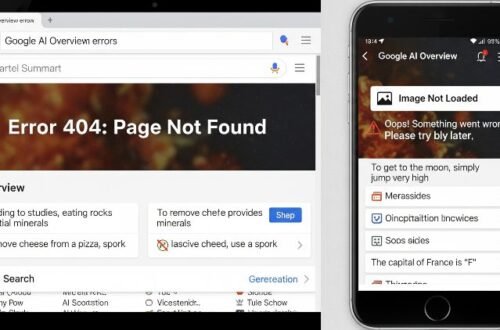Beyond the Blue Links: How AI is Radically Changing Search Engines
For decades, the ritual of search has been the same: type a few keywords, hit enter, and scan a list of ten blue links. But that familiar landscape is undergoing its most significant transformation since the dawn of Google. Artificial intelligence, particularly the rise of powerful Large Language Models (LLMs), is fundamentally reshaping how we find information, turning search engines from simple indexes into conversational, answer-first platforms.
This isn’t just a minor update; it’s a paradigm shift. Let’s explore the core technologies driving this change, how it’s affecting your search results today, and what it means for the future of the web.
From Keywords to Conversations: The Foundational Shift
Traditionally, search engines worked by matching the keywords in your query to keywords on a webpage. This system was effective but lacked a true understanding of context or intent. A search for “apple” could return results for the fruit, the tech company, or a record label.
AI has enabled a move towards semantic search. Instead of just matching words, the engine now strives to understand the meaning and intent behind your query. As Google has noted, people are increasingly using longer, more conversational queries. The goal of modern search is to understand these complex questions just as a human would.
The AI Engines Under the Hood
This evolution didn’t happen overnight. It’s been a gradual process built on increasingly sophisticated AI models.
The Stepping Stones: RankBrain and BERT
Google began laying the groundwork years ago. RankBrain, introduced in 2015, was its first AI-based system for interpreting queries, particularly novel ones it had never seen before. Then came BERT (Bidirectional Encoder Representations from Transformers) in 2019, a landmark model that allowed Google to understand the full context of a word by looking at the words that come before and after it. BERT was a massive leap, enabling the engine to grasp nuance, prepositions, and ambiguity far more effectively.
The Game-Changer: Large Language Models (LLMs)
Today’s revolution is powered by LLMs like Google’s Gemini and OpenAI’s models that power Microsoft’s Copilot. These models are trained on vast datasets of text and code, allowing them to generate new, human-like text, summarize complex topics, and hold a conversation. This is the technology behind the new generative search experiences.
Three Ways AI is Redefining the Search Experience Today
1. AI-Powered Overviews and Generative Answers
The most visible change is the “AI Overview” or “Generative Answer” that now appears at the top of many search results pages. Instead of just giving you links, services like Google’s SGE (Search Generative Experience) and Microsoft Copilot synthesize information from multiple top-ranking sources to provide a direct, summarized answer to your question.
This is designed to handle complex queries like “find a coffee shop in Brooklyn that’s open late, has Wi-Fi, and is dog-friendly” by providing a concise, actionable answer without requiring the user to click through multiple websites.
2. Multimodal Search: Beyond Text
AI allows search to break free from the text box. With multimodal AI, you can search using images, your voice, and text, often in combination. A practical example is Google Lens, where you can point your phone’s camera at a pair of shoes and ask, “where can I find these in brown?” The AI understands both the visual information (the shoes) and the text-based query (the color preference) to deliver relevant results.
3. Hyper-Personalization and Predictive Search
AI is making search results more relevant to the individual. By understanding your location, search history, and context, search engines can tailor results that are more likely to be useful to you. This can range from predicting your next query to prioritizing local businesses when you search for a service.
The Ripple Effect: What This Means for Everyone
This tectonic shift impacts all of us, from casual users to professional content creators.
For Content Creators and SEO Professionals
The rise of AI-generated answers presents a significant challenge. The era of optimizing for a single keyword to land in the top three blue links is fading. The focus must shift:
- Embrace E-E-A-T: Google’s quality guidelines—Experience, Expertise, Authoritativeness, and Trustworthiness—are more critical than ever. AI models are trained to surface information from trusted sources, so demonstrating these qualities is paramount.
- Answer Questions Comprehensively: Create content that directly answers the complex, conversational questions your audience is asking. Think in terms of topics and entities, not just keywords.
- Leverage Structured Data: Use schema markup to explicitly tell search engines what your content is about, making it easier for AI to parse and potentially include in a generated answer.
For the Everyday User
AI-powered search can be incredibly powerful, but it requires a new level of digital literacy.
- Refine Your Prompts: Treat the search bar like a conversation. The more detail and context you provide, the better the AI-generated answer will be.
- Verify the Source: AI overviews are syntheses and can sometimes make mistakes or “hallucinate” information. Always check the linked sources to verify critical information.
The Elephant in the Room: Ethical Challenges and the Future of the Web
The new age of search is not without its controversies. A major concern is the potential impact on publishers. If users get their answers directly on the search results page, they have less reason to click through to the original websites. This threatens the ad-based business models that have supported a free and open web for decades.
Industry analysts are already sounding the alarm. A recent forecast by Gartner predicts that search engine traffic will drop by 25% by 2026 as users turn to AI chatbots and generative answers.
Furthermore, issues of AI bias, the potential for spreading misinformation at scale, and the immense environmental cost of training and running these models are all critical challenges that the industry must address.
The Path Forward: Navigating the New Search Landscape
AI is irrevocably changing search engines from a directory of links into a dynamic, interactive knowledge engine. This brings immense potential for faster, more intuitive access to information. However, it also demands adaptation from creators and critical thinking from users.
The blue links won’t disappear overnight, but their role is diminishing. The future of search lies in conversation, synthesis, and a symbiotic—if sometimes tense—relationship between human creators and artificial intelligence.
Useful Resources to Explore Further
- Try it Yourself: Opt-in to Google’s Search Labs to experience SGE firsthand.
- Understand Quality: Read Google’s documentation on E-E-A-T and creating helpful content.
- See the Competition: Explore Microsoft’s Copilot (formerly Bing Chat) to see another vision for AI-powered search.




